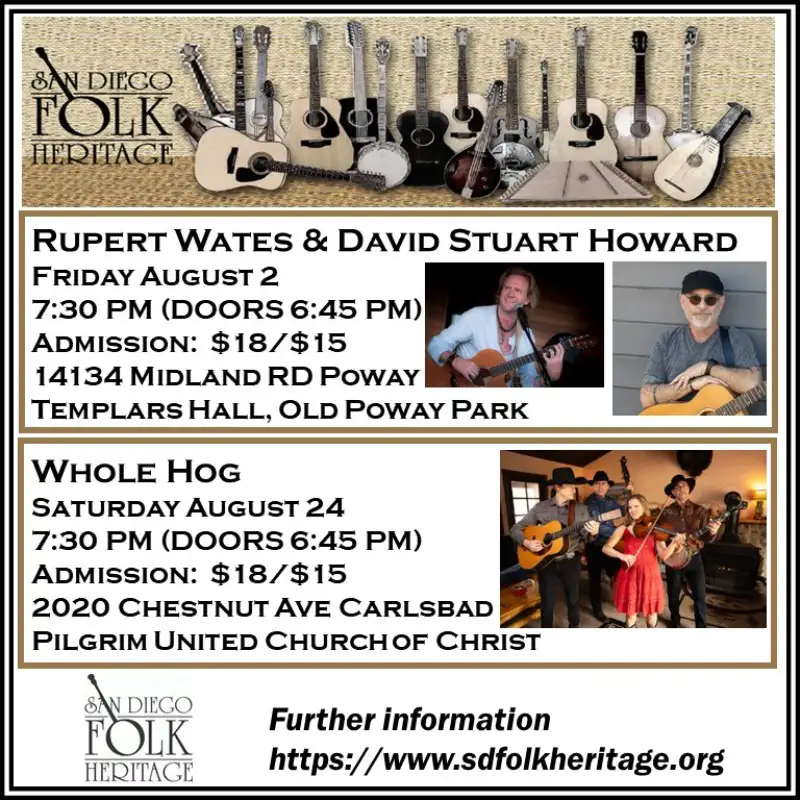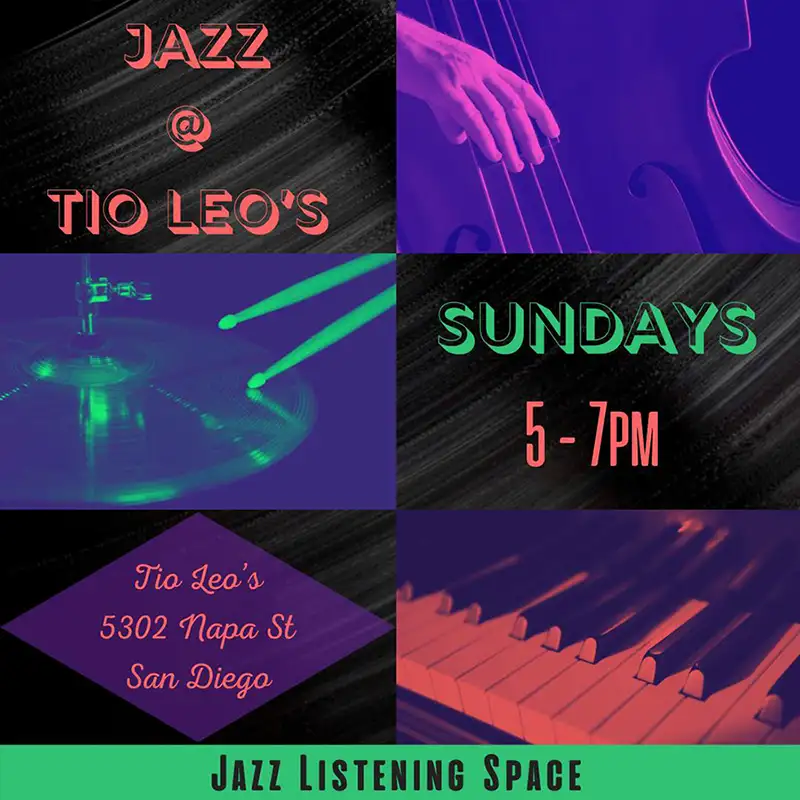Featured Stories
Bob Boss: Have Guitar Will Travel
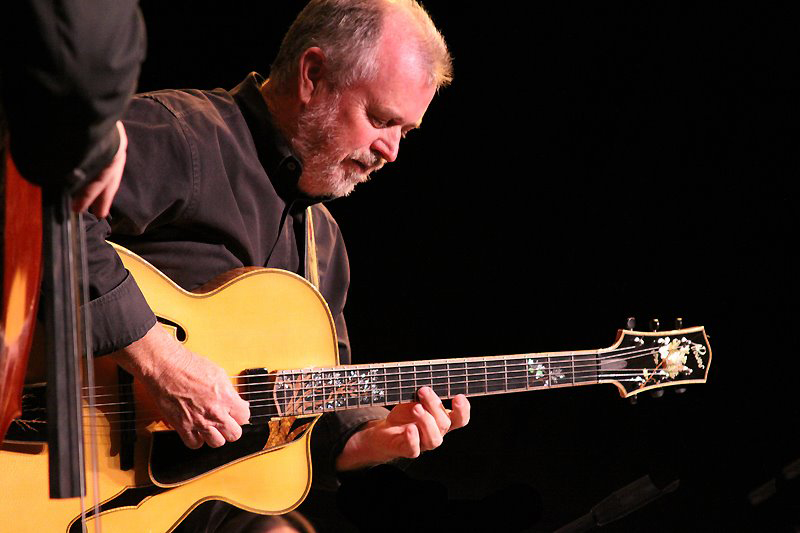
Bob Boss. Photo by Dennis Reiter.
Bob Boss came to San Diego back in 1984, some 39 years ago. He was already a working professional, and he’s continued to hone his substantial skills in a variety of ensembles, including work with Marshall Hawkins, Holly Hofmann, Gilbert Castellanos, and the late Mundell Lowe. He’s an intricate stylist, and his chord vocabulary might fill a normal bookcase in a guitar library.
Although he’s often thought of as a “bebop specialist,” Bob can play in a dizzying array of genres and styles. He went out on the road for three and a half years backing the eclectic pop singer A.J. Croce, for instance. I’ve even heard him playing spontaneously improvised music in the tradition of Sonny Sharrock’s contribution to the Wayne Shorter masterpiece, Super Nova.
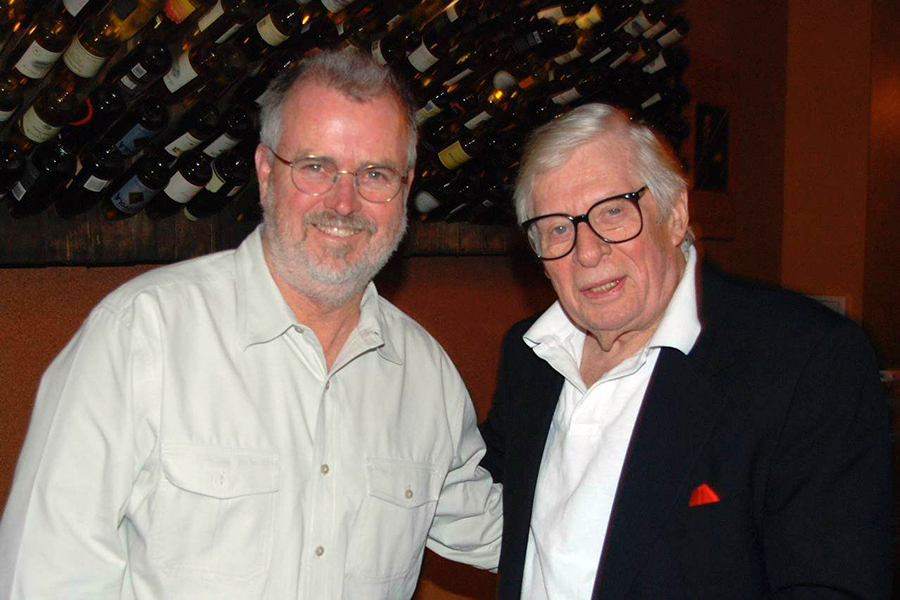
Boss and Mundell Lowe.
Back when he was raising a family, Boss played every gig that came his way, including corporate performances and casuals galore, because that’s how it’s done. He’s the ultimate journeyman, and the guitar is his tool of choice.
Bob comes from a musical family. “My dad played drums all the way through high school, but he sold them to buy a better car. My mom played violin when she was really young but gave it up, although she kept a little practice violin. They both thought learning an instrument was a good thing, so they bought me a little Sears Silvertone (Dan Electro) guitar, and they bought my sister a spinet piano. This a year before the Beatles came out on The Ed Sullivan Show.” Bob took to the guitar like a fish to water and was quickly playing parties with a neighborhood drummer, all without formal lessons although his dad did hire a local teenager who was more advanced to mentor him for a half-dozen casual lessons; he started learning by ear—which is a skill that is still paying dividends.
Fast forward a few years and Bob is in his freshman year of college at Chico State. His dad had advised him to leave the guitar at home, feeling that college itself would be enough of a challenge without music to serve as a distraction. “I started getting good grades right away, and it wasn’t that hard for me,” Boss recalls. Some of the other guys in the dorm handed him their guitars and he was encouraged to retrieve his instrument from back home. After jamming at keg parties and such with his peer group, Bob decided he wanted to jumpstart his playing, so on his first summer back home, he decided to improve his performance by seeking out a professional teacher.
“I saw an ad in the [San Francisco] Chronicle; Jerry Hahn (Bay Area legend) was giving lessons. He lived in Marin County, and I called him up. I’d go to his house on Saturdays, because I was working a 40-hour week in a factory to save money for my second year of college.” Right away, Bob’s playing began to transform. “I took about eight lessons from Jerry, and that really helped. He had me learning scales and an approach to improvisation. He was very encouraging. So, when I returned to college, everyone said, ‘Wow, what happened to you?’ That’s because I was a completely different guitar player.” Boss stayed in school, earning a master’s degree in English, but he continued to play music more and more obsessively. He initially considered a career as a music critic, but he decided to pursue music directly instead. “I thought I should commit and see how good I could get. I was playing five nights a week by the time I finished college, so I just stayed with it.”
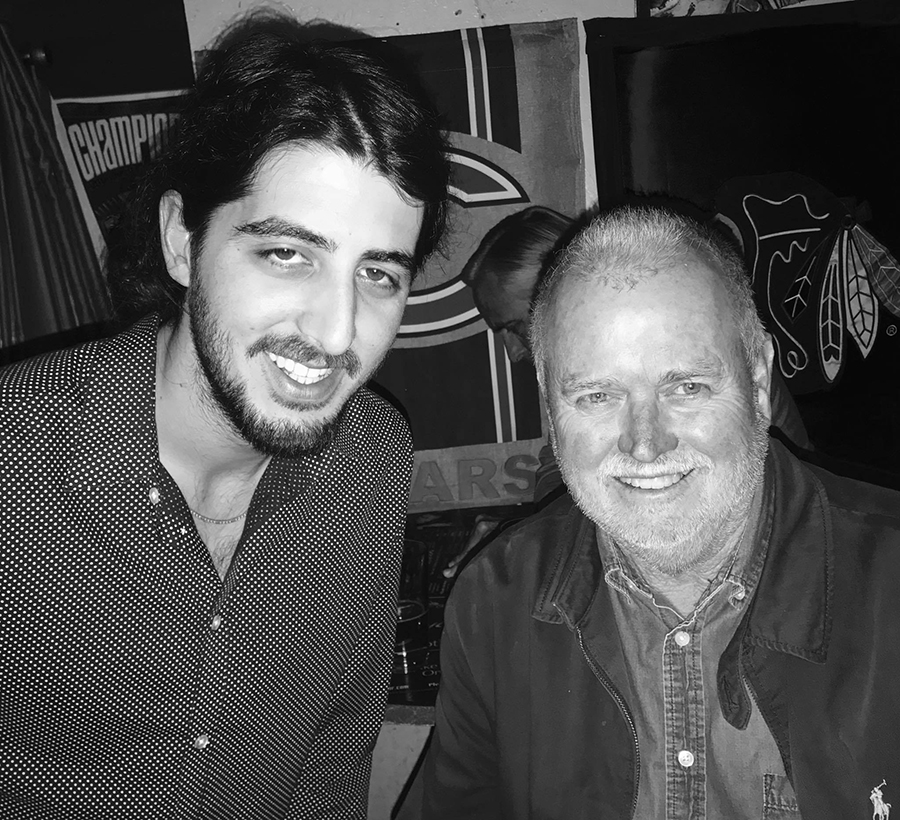
Boss with Louis Valenzuela.
Eventually, Bob left the Bay Area for San Diego for family reasons, and he arrived in Oceanside. He started gigging right away and kept busy as a freelance musician before he began fielding offers to teach. “Jimmie Cheatham asked me to teach at UCSD in 1990, and I think I was there four or five quarters until they got rid of the adjunct faculty. Then I went out on the road with A.J. Croce and did that for a few years. When I got back, I taught at Palomar College for a while, but I wasn’t happy with the situation, so I quit and went back to fulltime playing until Rick Helzer called me to fill in for Art Johnson for a semester while he was in France. I thought, ‘One semester, I’ll do it.’ Well, Art never came back. Rick asked me to stay on, and by then I saw what a great program and faculty they had, so I was in. It suited my interests better and the students were more serious. I stayed for 20 years and just retired at the pandemic.” In the meanwhile, Boss also taught at Mira Costa College, Mesa College, Idyllwild Arts Academy, and Gilbert Castellanos’ Young Lions Jazz Conservatory.
What does Boss get out of teaching? “Well, it forces you to define your awareness. It’s like writing in a way. Trying to explain something in a way that someone else can understand. There are a lot of things in music and playing guitar that become intuitive, and you don’t really think about how you do it—it’s just second nature. So, you have to stop and stand back from it and find a different way to explain it. And you have to think about the method the student needs, to use to learn, because everyone is different. Some people want you to show them directly, some want a very graphic representation of the notes, some want tablature, some would rather take a video with their phone, take it home and copy that. The main thing is I don’t want them to sound like me, I want them to sound like themselves.”
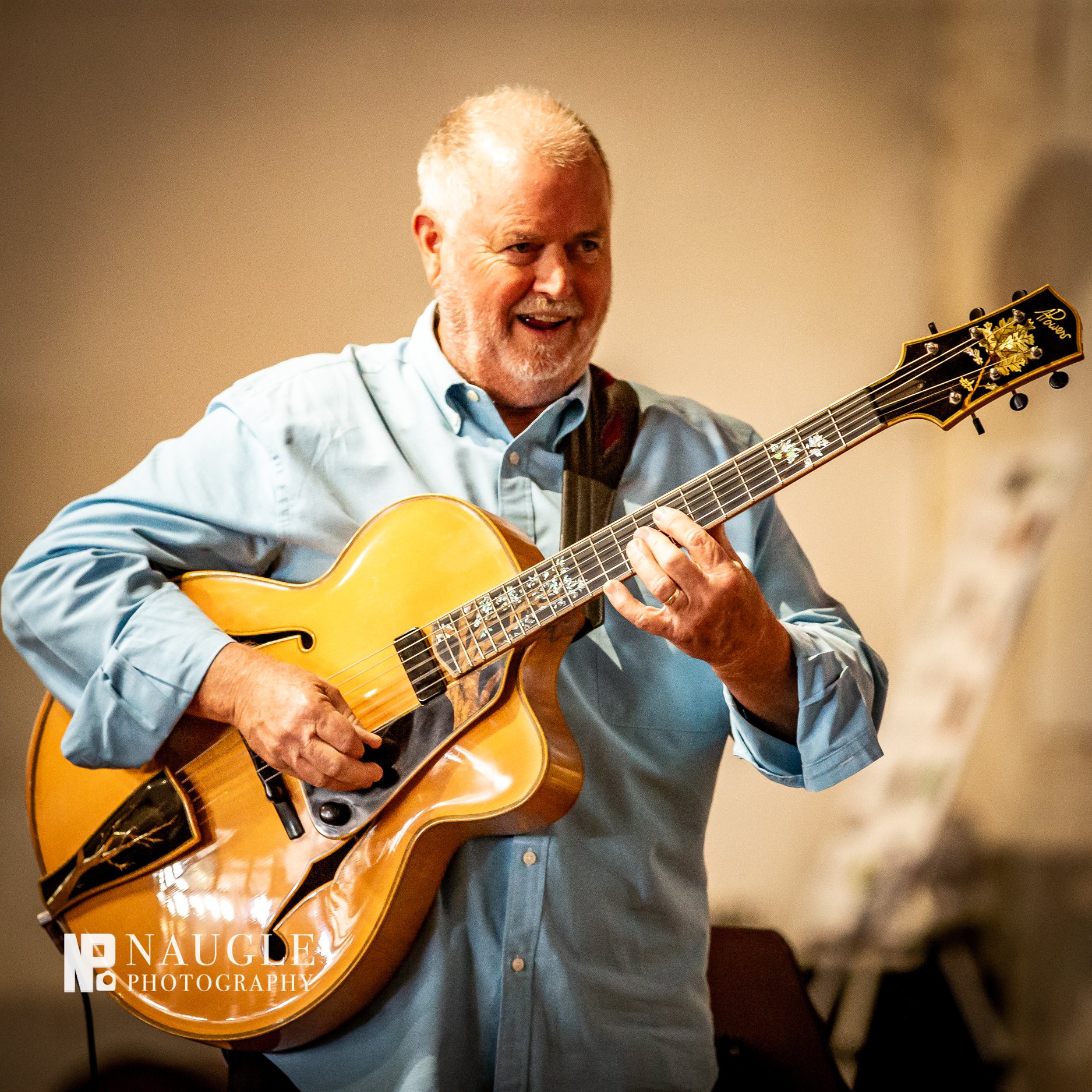
Photo by Jon Naugle.
What does he hope his students get from him? “At the beginning, I wanted everyone of them to be able to come out and sub for me. Just to come down, sit in and play. If I had two gigs and needed to pass one off, I want them to be able to do it. But a lot of them are not going to be making that kind of commitment. Some of them have different goals. They might be studying jazz guitar, but really want to play in a musical—so they get the skills of improvisation and some sight-reading skills. So, you really just want it to enrich their lives and for them to understand what’s involved in playing guitar and making music.” Boss has mentored many of San Diego’s emerging guitarists, including Louie Valenzuela, Alex Ciavarelli, and Rudy Marquez.
Now that he’s mostly retired from teaching—he’s still leading a class for the Young Lions Jazz Conservatory—Boss continues to stay busy. “I like to get the guitar out in the morning and start out the day that way. I started learning a lot of tunes that I hadn’t had time for when I was gigging all the time. So, I adapted this routine of just sitting in my room, turning on the amp, and pretending I’m playing a Sunday brunch somewhere, to keep all of these tunes fresh in my head. I still have some private students and I never know who might call for a gig. At this point, I’ve decided not to worry about casuals and corporate gigs anymore because that’s how I raised my family. That was what I put first—I didn’t move to New York or L.A. to have a huge career. I wanted to raise a family. [Bob has been married to his wife Vicky for 43 years! The daughters they raised are named Lucille and Rita.] So, living down here meant I had more work opportunities, and I didn’t have to drive quite as much so I could be home fairly often. I used to go from one job to another and take every job that came my way. And now I’m a little pickier about it.”
Have a listen to Bob Boss with Holly Hofmann, Rob Thorsen, and Duncan Moore at the Westgate Hotel, 2021.
https://www.facebook.com/100001536499480/videos/407826657407118
In addition to his mentorship to younger musicians, Boss has logged some serious work with a few true giants of a previous generation. “It has been my great honor and privilege to know and work with some of my elder pioneers in music. You asked about Mundell Lowe and Marshall Hawkins, and I can’t say enough about them. From the time we met, they both showed me what real skills sound like. Their approach to the music has always been serious, focused, and steady. I practically begged them for criticism, but they chose to lead by example. They fed me with information and inspiration. To that short list, I would have to add Ray Crawford, Daniel Jackson, Mike Wofford, and the Cheathams. These are all musicians who look you in the eye and say play the truth!”
I’ve had the pleasure of hanging out with Bob on several occasions helping him with some construction projects at his well-appointed home, and I can attest to his down-to-earth attitude. He has no airs about him. One thing I discovered was his very wide taste in music; we’ve had many animated conversations about free jazz, which I found he was equally enthusiastic about.
“I think it’s really important to be curious all the time and to be open all the time and to stay open to it and revisit things. So, some people might not expect that I’m open to [saxophonist] Albert Ayler, and they might not know that I played rock growing up. I’ve done rock ‘n’ roll gigs with bands in town, playing loud with distortion; I grew up listening to Jeff Beck and Jimi Hendrix. Those are two of my favorites.”



